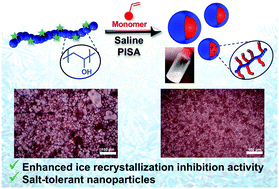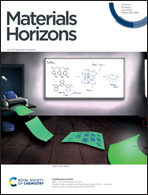Ice recrystallisation inhibiting polymer nano-objects via saline-tolerant polymerisation-induced self-assembly†
Abstract
Chemical tools to modulate ice formation/growth have great (bio)technological value, with ice binding/antifreeze proteins being exciting targets for biomimetic materials. Here we introduce polymer nanomaterials that are potent inhibitors of ice recrystallisation using polymerisation-induced self-assembly (PISA), employing a poly(vinyl alcohol) graft macromolecular chain transfer agent (macro-CTA). Crucially, engineering the core-forming block with diacetone acrylamide enabled PISA to be conducted in saline, whereas poly(2-hydroxypropyl methacrylate) cores led to coagulation. The most active particles inhibited ice growth as low as 0.5 mg mL−1, and were more active than the PVA stabiliser block alone, showing that the dense packing of this nanoparticle format enhanced activity. This provides a unique route towards colloids capable of modulating ice growth.



 Please wait while we load your content...
Please wait while we load your content...